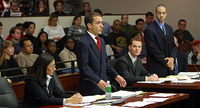Judge denies plan for secret evidence at pro-Israel lobbyists trial
A federal judge rejected prosecutors' request to close portions of an upcoming trial for two former pro-Israel lobbyists accusing them of violating the Espionage Act.

The government's proposal to keep huge swaths of evidence in the case out of public view was unprecedented and violated both the defendants' and the public's right to an open trial, U.S. District Judge T.S. Ellis said.
The defendants - Steven Rosen and Keith Weissman, who had been lobbyists with the American Israel Public Affairs Committee - are charged with illegally disclosing sensitive national defense information to persons not entitled to receive it, including journalists and foreign diplomats.
Under the prosecutors' plan, only the judge, lawyers and the jury would have been given access to classified evidence. Ellis said the proposal not only raised constitutional questions, but would have been unwieldy and likely confuse jurors.
On rare occasions, prosecutors have been allowed to use what is called the "silent witness" rule, in which only a jury receives classified information that is never disclosed to the public.
The defense contends that much of the information in question was already publicly available. Indeed, during Monday's hearing Ellis said that some of the information deemed classified by the government includes news reports.
Rosen's lawyer, Abbe Lowell, said he was pleased with Ellis' ruling and called the government's proposal unconstitutional and "worse than unprecedented."
A coalition of media organizations, including The Associated Press, and a coalition of Jewish organizations had also opposed the government's proposal.
Prosecutors said they would review their options, including a possible appeal that would delay the scheduled trial date of June 4. Another option is to craft unclassified substitutions of the classified evidence that would be given to the jury and would be made public.
The indictment alleges that Rosen and Weissman conspired to obtain classified reports on issues relevant to American policy, including the al-Qaida terror network; the bombing of the Khobar Towers dormitory in Saudi Arabia, which killed 19 U.S. Air Force personnel; and U.S. policy in Iran.
A former Defense Department official, Lawrence A. Franklin, already has pleaded guilty to providing Rosen and Weissman classified defense information. Franklin was sentenced to more than 12 years in prison.
Subscribe to Pravda.Ru Telegram channel, Facebook, RSS!





